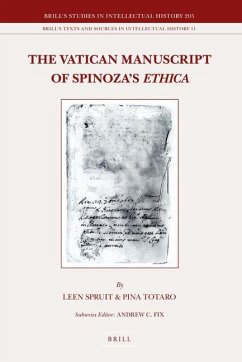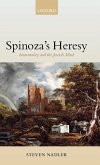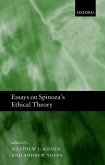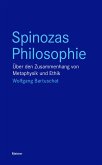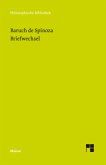Brill authors Leen Spruit and Pina Totaro discovered the original manuscript of Spinoza's "Ethica" in the Vatican library. This spectacular discovery attracted a lot of media attention.
The Vatican codex, which contains the complete text of Spinoza's Ethics, is the only surviving manuscript of this work and constitutes a document of great importance. On 23 September 1677, it was handed over to the Roman Holy Office by Spinoza's former friend Niels Stensen who had converted to Catholicism in 1667. Thus, it predates the publication of the Opera Posthuma, which is dated 1677, but which did not in fact appear until the first months of 1678. Recent research and fresh documentation allow us to determine the several stages of the manuscript's life before it reached Rome, where it was kept in the Archive of the Holy Office, and subsequently, transferred to the Vatican Apostolic Library, in 1922.
The Vatican codex, which contains the complete text of Spinoza's Ethics, is the only surviving manuscript of this work and constitutes a document of great importance. On 23 September 1677, it was handed over to the Roman Holy Office by Spinoza's former friend Niels Stensen who had converted to Catholicism in 1667. Thus, it predates the publication of the Opera Posthuma, which is dated 1677, but which did not in fact appear until the first months of 1678. Recent research and fresh documentation allow us to determine the several stages of the manuscript's life before it reached Rome, where it was kept in the Archive of the Holy Office, and subsequently, transferred to the Vatican Apostolic Library, in 1922.
"[...] it is clear that Spruit and Totaro's transcription of the VMS will be an important resource for historians and philosophers for many years to come." - John Brandau, Johns Hopkins University, in: Seventeenth-Century News, pp. 100-102
"[...] [D]e wereld [is] de ontdekkers van een eerder manuscript van de Ethica, dat eind 2011 door Brill is uitgegeven, met recht dankbaar. [...] Zonder The Vatican Manuscript of Spinoz's Ethica is [...] geen onderzoek van de tekst van de Ethica [...] mogelijk." - Henri Krop, in: Tijdschrift voor Filosofie, Vol. 74, No. 2 (second quarter, 2012), pp. 351-353
"Im Rahmen des grossen Projekts zur Erfassung der zwischen 1550 und 1800 von der Inquisition angestrengten Zensurverfahren und geführten Prozesse gegen Philosophen[...] ist einer der beteiligten Wissenschafter, Leen Spruit, auf ein Manuskript der «Ethik» aus dem Jahr 1675 gestossen, das somit zu Lebzeiten Spinozas angefertigt worden ist. Die geringfügigen Abweichungen vom gedruckten Text geben uns nun endlich die Gewissheit, dass Spinoza tatsächlich das geschrieben hat, was postum unter seinem Namen erschienen ist." - Christoph Lüthy, in: Neue Zürcher Zeitung (21 September 2011)
"La pubblicazione di questo importante volume nella prestigiosa collana dei "Brill's Studies in Intellectual History" mostra quanto sia utile unire l'approccio della "storia filosofica della filosofia", la storia della filosofia tradizionale, con quello della "storia storica della filosofia", secondo il metodo d'indagine interdisciplinare messo a punto ieri dalla history of ideas e oggi dalla intellectual history." - Hansmichael Hohenegger, in: Sole 24 (18 September 2011)
"[...] [D]e wereld [is] de ontdekkers van een eerder manuscript van de Ethica, dat eind 2011 door Brill is uitgegeven, met recht dankbaar. [...] Zonder The Vatican Manuscript of Spinoz's Ethica is [...] geen onderzoek van de tekst van de Ethica [...] mogelijk." - Henri Krop, in: Tijdschrift voor Filosofie, Vol. 74, No. 2 (second quarter, 2012), pp. 351-353
"Im Rahmen des grossen Projekts zur Erfassung der zwischen 1550 und 1800 von der Inquisition angestrengten Zensurverfahren und geführten Prozesse gegen Philosophen[...] ist einer der beteiligten Wissenschafter, Leen Spruit, auf ein Manuskript der «Ethik» aus dem Jahr 1675 gestossen, das somit zu Lebzeiten Spinozas angefertigt worden ist. Die geringfügigen Abweichungen vom gedruckten Text geben uns nun endlich die Gewissheit, dass Spinoza tatsächlich das geschrieben hat, was postum unter seinem Namen erschienen ist." - Christoph Lüthy, in: Neue Zürcher Zeitung (21 September 2011)
"La pubblicazione di questo importante volume nella prestigiosa collana dei "Brill's Studies in Intellectual History" mostra quanto sia utile unire l'approccio della "storia filosofica della filosofia", la storia della filosofia tradizionale, con quello della "storia storica della filosofia", secondo il metodo d'indagine interdisciplinare messo a punto ieri dalla history of ideas e oggi dalla intellectual history." - Hansmichael Hohenegger, in: Sole 24 (18 September 2011)

